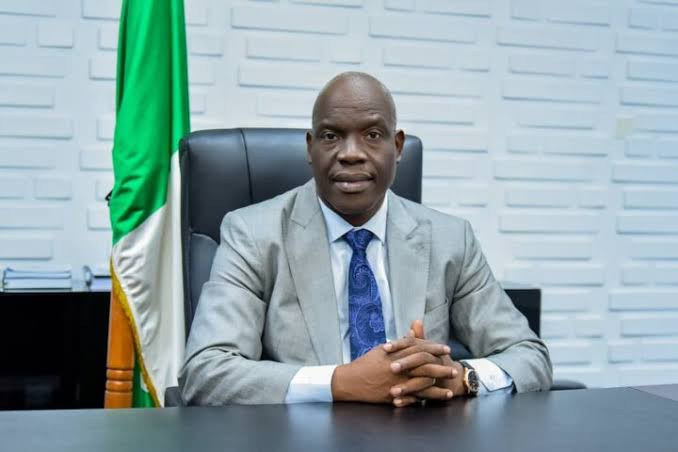Organizations has commended Mr. Gbenga Komolafe, the chief executive officer of the Nigerian Upstream Petroleum Regulatory Commission (NUPRC) for his transparency, efficiency and developmental strides in the growth of the Nigeria’s oil sector.
The coalition include, Rising-Up for a United Nigeria; National Coordinator, Guardians of Democracy and Development Initiative; Rural Empowerment and Development Initiative; Executive Director, Independent Public Service Accountability Watch; Nigeria Youth Advocacy for Good Governance Initiative and Executive Director, Governance and Economic Development Monitoring Initiative
Speaking at a world press conference in Abuja, on Monday, leader of the coalition and convener, Rising-Up for a United Nigeria, Amb. Solomon Adodo praised the NUPRC boss for keying into President Bola Tinubu’s Renewed Hope Agenda by improving the oil regulatory activities and shoring up significant strategic production output since his assumption of office.
According to the groups: “Four days ago, President Bola Ahmed Tinubu marked his one fruitful year in office. He came into office at a time of obvious economic crisis that could have led many leaders to despair.
“For the Renewed Hope Agenda of President Tinubu to have succeeded so far, especially on the economic front, certain key agencies and officers have worked tirelessly, noiselessly and profoundly to deliver creditably on their mandate. The Nigerian Upstream Petroleum Regulatory Commission (NUPRC) is foremost among those agencies. This principally hinged on the fact that with the coming on board of President Tinubu, the NUPRC received reinvigorated support which led to improvements in operations and the resultant significant increase in crude oil output and earnings for our dear nation at this critical point.
“It is in recognition of the enormous achievements of NUPRC that its outstanding Chief Executive Officer, Engr. Gbenga KOMOLAFE was bestowed with the highly prestigious Sun Public Service Award this year amongst several other recognitions and commendations both locally and internationally.
“Unlike the old order where some agencies in the oil and gas sector were accused of opaqueness, the NUPRC under Engr. Komolafe is known for openness, clarity, ease of doing business and predictability of business outcomes, which is why more upstream oil investors are flooding the country. This tide of positive news for the country does not, however, sit well with those who seek to antagonize the government and ensure President Bola Ahmed Tinubu fails even at the detriment of our collective progress. It is thus imperative that we assess the degree of success recorded in the Nigerian Upstream Petroleum Regulatory Commission since the advent of this administration whilst preferring pathways for greater support to the Commission,” the group said
Commenting on the excellent achievements of the NUPRC chief executive, the groups noted that Engineer Komolafe has been able to stabilize the oil business environment and attract massive productive partnerships.
“Some of his significant milestones include: “A significant reduction in crude oil theft since the Commission conducted a comprehensive audit of crude oil theft and evaluated the integrity of upstream assets to determine the actual extent of theft in the industry. Further measures were implemented to address crude oil theft by enhancing cargo declaration and upstream measurement processes. Additionally, enhanced regulations were put in place to combat crude oil theft, thus resulting in a major boost to Nigeria’s crude oil production from below one million barrels per day to above 1.6 million barrels per day. Presently, Nigeria’s oil production and output is at an all-time high and the environment, most conducive for business. This has led to a reversal in oil investment decline.
“The Commission undertook a comprehensive industry-wide study aimed at reactivating inactive wells in Nigeria, unlocking 700 thousand barrels of oil per day. The NUPRC also developed a template for Domestic Crude Oil Supply Obligation (DCSO) to ensure sufficient and uninterrupted feedstock to all local refineries to serve Nigeria’s domestic petroleum needs.
“All existing crude handling agreements have undergone a comprehensive review aimed at bolstering transparency and fostering competitiveness in the process of crude evacuation. This initiative is already beginning to yield a reduction in both capital and operational expenditure.
“In the area of growth of reserves, the Nigerian Upstream Petroleum Regulatory Commission (NUPRC) issued its first Petroleum Exploration License (PEL) for a geophysical survey project aimed at acquiring approximately 56,000 square kilometres of 3D seismic and gravity data offshore in the Niger Delta. A feat that will place Nigeria in the frontlines in the comity of OPEC nations.
“For optimal efficiency, the NUPRC advanced the mini bid licensing round for seven deep offshore Petroleum Prospecting Licenses (PPLs) to boost national reserves. This effort, resulted in an increase of the country’s crude oil reserves to 37.50 billion barrels of oil and 209.26 trillion cubic feet of gas, reflecting a 1.43% and 0.21% increase, respectively, compared to 2023 figures.
“The Commission with proper foresight also engaged Exploration & Production companies to unlock approximately 57 trillion cubic feet of uncommitted or unmonetised gas reserves Furthermore, the annual Domestic Gas Delivery Obligation (DGDO) has been issued to all leasees to drive growth in gas production. This initiative seeks to balance export portfolios with the expanding demand in the domestic gas market with a resultant lower gas prices. The DGDO algorithm will unlock more upstream gas supply for increased domestic gas utilisation.
“As a significant transparency milestone in oil and gas revenue optimisation, the Commission has effectively transitioned the management of Fiscal Oil Prices (FOP) differentials from NNPCL to NUPRC It began publishing market-reflective Fiscal Oil Prices (FOP) differentials on NUPRC’s website in line with the transparency objectives of the Petroleum Industry Act 2021.
“The Commission has conducted a thorough audit of the capability of upstream operators to generate enough revenue or resources to cover their operational costs and obligations. In this context, the Commission has carried out an initial financial viability assessment for upstream petroleum companies to ensure the sector’s long-term financial sustainability and stability. This has significantly boosted investor confidence in the upstream sector.
“Engr. Komolafe has also seen to the re- engineering of the Nigeria National Data Repository (NDR), monetization of oil blocks and the alignment of regulations with global energy transition initiatives and carbon footprint reduction goals. Nigeria’s commitment to the elimination of gas flaring is a testament to Engr. Komolafe’s goal-getting doggedness. Under the Nigerian Gas Flare Commercialization Program (NGCP), it has forty-nine flare sites for commercialization, demonstrating commitment to environmental sustainability and resource optimization. The Nigerian Gas Flare Commercialisation Programme (NGFCP), the initiative has accounted for the monetisation of approximately 50% of gas currently being flared towards achieving the Net Zero target. A 60% reduction in fugitive methane emissions from oil and gas was achieved for the first time based on robust data provided by the Commission. The NUPRC engaged with the International Finance Corporation regarding opportunities surrounding Carbon Capture Utilization and Storage (CCUS). To advance energy transition, decarbonisation, and carbon monetisation, the Commission established an Energy Transition and Carbon Monetisation unit, formulated a regulatory framework, and commenced enabling carbon credit earnings through a defined framework for key climate action initiatives and related activities.
“As a proactive inclusive development approach to ensure seamless operations, the Nigerian Upstream Petroleum Regulatory Commission has also expedited the execution of the Host Community Development Regulation and incorporated the Host Communities Development Trust Fund (HCDTF) to curb community restiveness and foster a conducive business environment. This enabled the incorporation of 111 Host Communities Development Trusts (HCDTs) at the Corporate Affairs Commission. The Commission developed “HostComply,” an intelligent, digital, automated platform for reporting and monitoring HCDT activities to ensure effective implementation and transparent administration of the HostCom provisions of the PIA. The Littoral States were assigned to deepwater operators, with qualified communities within these states communicating with their respective settlers. This has resulted in the elimination of needless agitations, communal clashes and militancy.
“Furthermore, as part of NUPRC’s effort to develop Frontier Basins, the Commission opened a Frontier Exploration Fund Account with the Central Bank of Nigeria, into which 30% of NNPC Limited Profit Oil and Profit Gas is paid. Additionally, the drilling of three wells was facilitated in the Frontier basins. The beneficiaries thus have more funds to develop and diversify their local economy.
“In all aspects of showcasing transparency, efficiency in regulatory activities and shoring up strategic production output, the Nigerian Upstream Petroleum Regulatory Commission has blazed the trail with several valued achievements. This can be attributed to the reinvigorated zeal to march on with President Tinubu’s renewed hope agenda. So as the government celebrates one year of success in the petroleum industry, it is imperative that public officers like Engr. Gbenga Komolafe be singled out and celebrated for giving life to Mr. President’s vision and adding value to governance.
The groups further warned detractors to desist from maligning the image of the NUPRC chief, stressing that that “those who profit in dysfunctional systems are bound be very dissatisfied and plot against the obvious progress being made.”
“The Commission must not be distracted and its leadership under Engr. Komolafe must not rest on his oars in ensuring that the Nigerian Upstream oil industry is a global reference point,” the group concluded.



